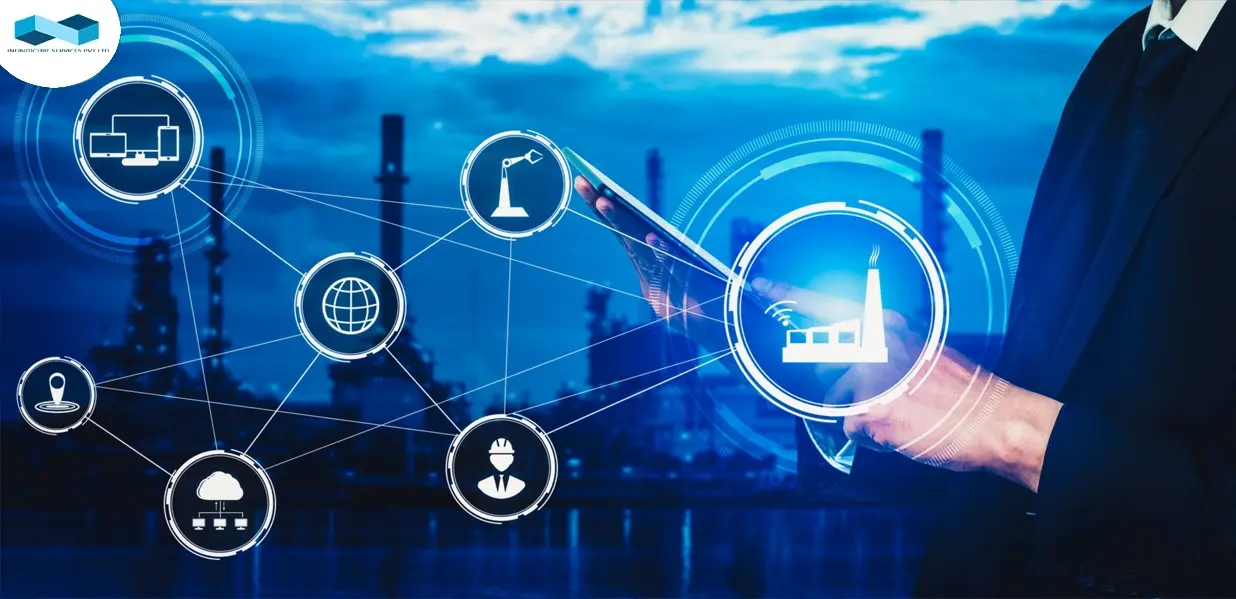10 Ways Industrial IoT Transforms Industries: An Ideal Guide (Part – 2)
I. Connected Devices in Agriculture
Connected devices in agriculture, also known as AgTech or precision agriculture, are transforming farming through data-driven decision-making and automation. These devices, including smart sensors, drones, IoT-enabled machinery, and robotic systems, optimize resource management and enhance productivity.
They enable precision farming, crop monitoring, livestock management, and supply chain optimization, improving efficiency and sustainability. The impact of connected devices in agriculture includes efficient resource management, improved yields, and agility in adapting to market demands.
These devices empower farmers to thrive in a changing agricultural landscape, promising a future of smarter, more sustainable farming practices with immense potential for addressing global food challenges.
A. Utilization of IoT in Agriculture and Farming
- IoT technology revolutionizes agriculture and farming operations
- IoT devices monitor soil, livestock, and equipment with precision
- Soil sensors optimize irrigation and fertilization practices
- GPS-enabled drones detect crop stress and pest infestations early
- Wearable sensors track animal health metrics for early illness detection
- Smart tractors autonomously perform tasks and provide performance data
- IoT enables informed decisions for resource optimization and sustainability
B. Benefits of Connected Devices for Precision Agriculture
- Connected devices in precision agriculture optimize resource usage through accurate information on fields
- Smart cameras and sensors help farmers detect pests and diseases early for timely action
- Environmental sustainability is promoted by reducing chemical inputs and ecological footprint
- Data from connected devices enables data-driven decision making for improved farm management practices
C. Improving Crop Yield and Sustainability with IoT
- IoT in agriculture aims to improve crop yield and sustainability
- Soil sensors monitor moisture, pH, and nutrients for optimized irrigation and fertilization
- IoT aids in proactive pest and disease management to protect crop yields
- Precision agriculture optimizes water usage, reduces waste, and conserves resources
- IoT enhances farming resilience and efficiency in the face of climate change and challenges
II. IoT Sensors in Healthcare
IoT sensors in healthcare revolutionize patient care with real-time monitoring, asset management, remote care, and preventive measures. They enhance personalized treatment, streamline inventory, reduce costs, and promote wellness. Overall, IoT sensors drive transformative changes in healthcare, improving efficiency and advancing patient-centered care delivery.
A. Role of IoT Sensors in Healthcare Monitoring
- IoT sensors are essential in healthcare monitoring, providing real-time data on health parameters
- Sensors integrated into wearable devices, medical equipment, patient rooms for continuous monitoring
- Enables remote tracking of patients' health status, early detection of deterioration, and prompt intervention
- Monitors chronic conditions, medication adherence, physiological changes, and emergencies
- Improves patient outcomes, reduces healthcare costs by minimizing readmissions and complications
B. Remote Patient Monitoring and Health Tracking
- Remote patient monitoring (RPM) has seen remarkable progress with the integration of IoT technology, expanding healthcare providers' capabilities beyond traditional clinical settings.
- Continuous Health Monitoring: IoT-enabled devices like smart wearables, blood pressure monitors, and glucose meters gather comprehensive health data and transmit it instantly to healthcare providers. This real-time monitoring enables early detection of health issues, facilitating timely interventions and treatment adjustments for better patient outcomes.
- Utilizing Health Tracking Apps: Health tracking applications with IoT connectivity allow individuals to monitor various aspects of their daily lives, such as physical activity and sleep patterns. Analyzing this data helps users identify trends, pinpoint areas for improvement, and make informed decisions to enhance overall well-being.
- With continuous monitoring and data-driven insights, patients can actively manage their health, while healthcare providers can provide personalized care and support, leading to improved health outcomes and a higher quality of life.
C. Enhancing Healthcare Services with IoT Technology
- IoT technology enhances healthcare services and patient experiences
- IoT-enabled smart hospital systems automate processes and optimize efficiency
- Sensors monitor medical supplies, equipment, assets, and facility management tasks
- Telehealth solutions offer virtual consultations, remote diagnosis, and EHR management
- Improves access to healthcare in rural areas and enhances personalized care
- Real-time data collection and analysis lead to better health outcomes and patient experience
III. Industrial Automation Systems
Industrial automation systems enhance efficiency, safety, and competitiveness in industries by automating tasks. Components include control systems, sensors, HMIs, and communication networks. Advantages include increased efficiency, enhanced safety, quality improvement, and resource optimization. Automation ensures consistent product quality, reduces waste, and improves sustainability, driving operational excellence and innovation in industries.
A. Overview of Industrial Automation
- Industrial automation uses control systems and technologies to automate processes in various industries.
- Goal is to improve efficiency, productivity, and safety by reducing manual intervention and optimizing resources.
- Systems include hardware and software components like conveyor belts, robotic arms, PLCs, and SCADA.
- Integration of automation technologies helps streamline operations, minimize errors, and enhance performance.
B. Integration of IoT Devices in Automation Systems
- IoT devices in automation allow real-time data acquisition, monitoring, and control
- Sensors, actuators, and smart devices collect and transmit data for seamless integration
- IoT-enabled sensors in manufacturing optimize production processes by monitoring operating conditions
- In logistics, IoT devices track inventory, monitor shipments, and improve efficiency
- Predictive maintenance with IoT sensors minimizes downtime, reduces costs, and extends asset lifespan
C. Improving Efficiency and Safety through Industrial Automation
- Industrial automation improves efficiency and safety in various industries
- Automation optimizes workflows, increases output, and reduces cycle times
- Reduces human error, maintains product quality, and enhances workplace safety
- Automation minimizes defects, lowers scrap rates, and increases customer satisfaction
- Robotic systems handle heavy loads and dangerous tasks, reducing accidents and injuries
- IoT technology enhances automation benefits in efficiency, productivity, and safety
IV. IoT Integration in Logistics
IoT integration in logistics transforms supply chain management with benefits like real-time tracking and monitoring. It enhances efficiency by providing continuous updates on goods' location, condition, and temperature during transit.
IoT sensors improve inventory management by offering real-time data insights on stock levels, demand patterns, and shelf life, optimizing inventory levels and reducing holding costs. Predictive maintenance solutions for fleet management, enabled by IoT sensors in vehicles, optimize performance, lower maintenance costs, and enhance reliability.
Route optimization through IoT integration reduces fuel consumption, transportation costs, and carbon emissions, improving delivery times and sustainability. Enhanced security measures with IoT integration include real-time alerts for unauthorized access and theft, safeguarding valuable cargo and maintaining the integrity of the supply chain.
Overall, IoT integration offers innovative solutions for tracking, inventory management, maintenance, optimization, and security in logistics, leading to efficiency gains and cost savings in supply chain management.
A. Importance of IoT in Logistics and Supply Chain Management
- IoT technology enhances efficiency, transparency, and innovation in logistics and supply chain management
- Benefits include real-time tracking, predictive analytics, and data-driven decision-making
- IoT empowers professionals with actionable insights, streamlines processes, minimizes costs, and boosts competitiveness
B. Tracking and Monitoring Goods with IoT Devices
- IoT devices like GPS trackers, RFID tags, and sensors track goods in supply chain
- Real-time data on location, condition, and status
- Enables proactive decision-making to address delays, theft, or damage
- Monitors environmental factors like temperature, humidity, and vibration
- Ensures optimal handling and transportation for quality and integrity of goods
C. Optimizing Logistics Operations through IoT Integration
- IoT integration optimizes logistics operations by connecting stakeholders, processes, and systems seamlessly.
- Predictive analytics forecast demand, optimize inventory, and streamline procurement, reducing stockouts and excess inventory costs.
- Predictive maintenance through IoT prevents downtime and reduces maintenance costs for vehicles and infrastructure.
- IoT enhances supply chain agility and efficiency, unlocking opportunities for optimization and growth.
V. Smart Energy Management
Smart energy management optimizes energy use, reduces costs, and promotes sustainability through advanced technologies. It integrates sensors, IoT devices, automation, and data analytics to monitor and optimize energy consumption in real time.
Components include energy monitoring, automation systems, energy analytics platforms, and demand response systems. Benefits include cost savings, improved efficiency, environmental sustainability, and enhanced reliability of energy infrastructure.
Organizations can achieve energy management objectives efficiently by leveraging data-driven insights and advanced technologies.
A. Implementing IoT for Energy Monitoring and Optimization
- Implementing IoT for energy monitoring involves deploying sensors, meters, and devices for real-time data collection.
- IoT devices gather information on energy usage, equipment performance, and environmental conditions for actionable insights.
- Organizations use IoT to identify inefficiencies, excessive consumption, and optimize energy usage.
- Smart sensors in buildings monitor HVAC systems and lighting to find energy-saving opportunities.
- IoT platforms use analytics and machine learning to analyze data, forecast demand, detect anomalies, and recommend optimization strategies.
B. Benefits of Smart Energy Management Systems
- Smart energy management systems offer cost savings through identifying and eliminating wasteful energy consumption.
- Energy efficiency is enhanced by optimizing energy usage and reducing waste.
- Environmental sustainability is promoted through reducing greenhouse gas emissions and conserving resources.
- Operational optimization is achieved by improving equipment performance and system reliability.
- Data-driven decision making is facilitated by providing valuable insights and actionable data.
C. Examples of IoT Applications in Energy Efficiency
- Smart Grids: Monitor energy flow, detect faults, optimize distribution.
- Smart Buildings: Optimize lighting, HVAC systems, enhance occupant comfort.
- Industrial Automation: Monitor energy usage, optimize equipment performance.
- Renewable Energy Integration: Efficient generation, storage, distribution of renewable power.
- Transportation and Logistics: Optimize route planning, reduce energy usage in transportation.
- IoT revolutionizes energy monitoring, management, optimization.
- Benefits: Cost savings, operational efficiency, and sustainability.



